
|

|
Forum Index : Microcontroller and PC projects : How to talk to a MAX6675 with a MM2....
| Page 1 of 2 |
|||||
| Author | Message | ||||
Grogster Admin Group Joined: 31/12/2012 Location: New ZealandPosts: 9877 |
Hi all  I have some MAX6675 chips I want to put to use, but I am unsure how to talk to them. They use a simple-ish sounding SPI type protocol, so my first thought was simply the built-in SPI protocol in the MM2. However, these devices output 12-bit words, not 8/16/32-bit ones that the SPI channels are designed to deal with, so I think I would need some kind of bit-banging approach to talk to them, yes? DATASHEET: MAX6675 K-type thermocouple to SPI interface.pdf Page 5 gives details on the serial interface, and it seems easy enough - pull the 6675's CS pin low as you would any other SPI device, feed it a clock signal to its clock input, and read the bits out. The last bit(pun not intended!) is the bit I am stuck with. How could I read 12 bits when the SPI channel protocol in the MM2 only allows you to have 8-bit, 16-bit or 32-bit words? Twelve is not compatible with any of those.  I am wondering if I could read 16-bits, and somehow disregard the extra 4 bits? I know my way around UART at an expert level now, but am still something of an amateur with I2C or SPI, simply as I don't really use them that much. Can anyone here suggest how I might go about reading the output from these devices? Thanks for any replies to this thread.  Smoke makes things work. When the smoke gets out, it stops! |
||||
Grogster Admin Group Joined: 31/12/2012 Location: New ZealandPosts: 9877 |
Further to the above post, having read my way further into the datasheet, I THINK the output is actually a 16-bit word - see page 6. It would seem I could not see the forest for the trees - my brain wondering how to read 12-bits, not realizing that there ARE actually 16-bits in the data output - 12 of those 16 are thermocouple data bits, the other bits - are other bits.   Where is my brain? (RHETORICAL!!!!)   EDIT: Now I have a 16-bit word, I need to be able to filter just bits 14 to 3 - the 12-bit data. Assume the other bits are all zero. Could I use one of those AND mask ideas for that? 6675 data byte AND 1000000000000111 kind of idea? I'm not sure I have the mask idea correct either, but hopefully you can see what I mean - ignore bits 15, 2, 1 and 0 - just give me the value of the other 12 bits of the word..... Edited 2021-06-17 17:21 by Grogster Smoke makes things work. When the smoke gets out, it stops! |
||||
| Volhout Guru Joined: 05/03/2018 Location: NetherlandsPosts: 5703 |
Yes, it is 16 bit. When you get the response you have to use bits 14...3 to get the 12 bit result. As you suggested, mask it, and then >>3 (or divide by 8). Configure the SPI port for "data valid at falling edge of clock". The max. SPI clock is 4.3MHz, so if you use 1MHz you will have plenty of margin. Volhout... Edited 2021-06-17 17:26 by Volhout PicomiteVGA PETSCII ROBOTS |
||||
Grogster Admin Group Joined: 31/12/2012 Location: New ZealandPosts: 9877 |
OK, I acknowledge the 1MHz clock suggestion. Now, how do I read JUST bits 14-3? Generally speaking, bits 15, 2, 1 and 0 should be zero, so just reading the value of the 16-bit word would be fine, BUT if bits 2, 1 or 0 change, that will affect the value of the returned word, so I need to work out how to mask out those bits. Will my mask idea above work do you think? EDIT: We're crossing over editing!  Pseudo code: Data = 6675 byte AND 1000000000000111 >>3 I will try it tomorrow, but I want to be reasonably sure I understand what I am doing before I do. EDIT: WHY do I need to >>3 or divide by eight? Don't we want the full 12-bit data? I might be missing something VERY obvious here - I am no SPI expert in any interpretation of the word! Edited 2021-06-17 17:33 by Grogster Smoke makes things work. When the smoke gets out, it stops! |
||||
| JohnS Guru Joined: 18/11/2011 Location: United KingdomPosts: 4244 |
That AND will remove the bits you want. But you could do it (using TheWord as it's not a byte!). You'll need to prefix the numbers with something so MMBasic sees a binary number (I'm away and can't recall how MMBasic does it, but let's guess 0b prefix): E.g. Data = TheWord AND 0b1000000000000111 Data = TheWord - Data Or Data = TheWord AND 0b0111111111111000 Then you have roughly what you want. It's in the wrong place so you need to shift it right 3 bits as others have posted. Data = Data >> 3 John Edited 2021-06-17 17:51 by JohnS |
||||
Grogster Admin Group Joined: 31/12/2012 Location: New ZealandPosts: 9877 |
Thanks chums.  So, therefore: T=THCOUPLE AND &b011111111111000 THCOUPLE being the 16-bit word read back from the 6675 chip. ??? It looks like I had my AND idea the wrong way around. (what should have been zeros were ones and vise-versa) Or, perhaps shortened to: D=THCOUPLE AND &h7FF8 >>3 Edited 2021-06-17 18:12 by Grogster Smoke makes things work. When the smoke gets out, it stops! |
||||
| JohnS Guru Joined: 18/11/2011 Location: United KingdomPosts: 4244 |
Yes, but I'd use some parens D=(THCOUPLE AND &h7FF8) >>3 John |
||||
Grogster Admin Group Joined: 31/12/2012 Location: New ZealandPosts: 9877 |
Great, thanks.  Smoke makes things work. When the smoke gets out, it stops! |
||||
| Turbo46 Guru Joined: 24/12/2017 Location: AustraliaPosts: 1663 |
It appears to me that if you only want the 12 bits of data and are going to ignore the umpteen higher bits in the integer then all you need to do is: D = THCOUPLE >> 3 Bits 0 to 11 will hold the data you want. Bill Keep safe. Live long and prosper. |
||||
Grogster Admin Group Joined: 31/12/2012 Location: New ZealandPosts: 9877 |
OK, I will try that also - thanks.  Smoke makes things work. When the smoke gets out, it stops! |
||||
Grogster Admin Group Joined: 31/12/2012 Location: New ZealandPosts: 9877 |
Further to this, I am getting a result, but it is ALWAYS the same number no matter what. I have tried all the SPI modes, and although I get different values for different modes, the values for any given mode is always the same number. I pick up the thermocouple in my hand, which should change the reading as my hand warms up the thermocouple, but that is not happening. Anyone got any ideas of anything else I can try? 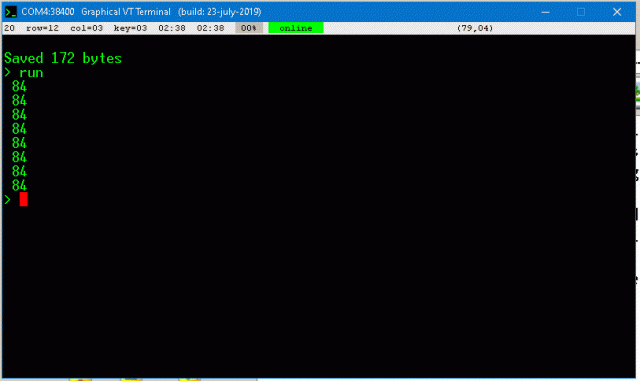 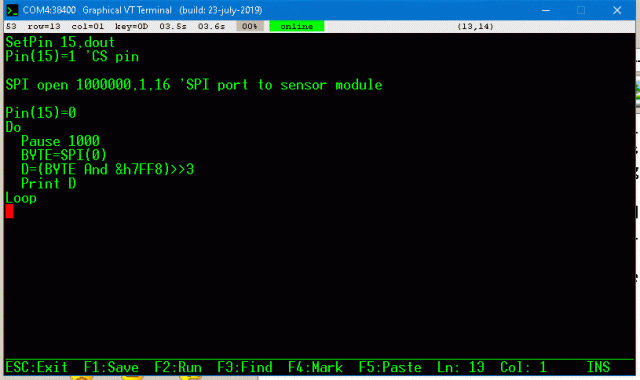 Smoke makes things work. When the smoke gets out, it stops! |
||||
| phil99 Guru Joined: 11/02/2018 Location: AustraliaPosts: 3016 |
As an experiment to see what the thermocouple is doing, print the whole 16 bits in binary then warm it and see which bits change. Do Pause 1000 BYTE = SPI(0) Print BIN$(BYTE, 16), BIN$((BYTE >> 3),16) loop The data sheet says bit 15 is always 0 so: D = BYTE >> 3 As shown in a pervious post should do the trick. Also try swapping D+ and D- to see if the thermocouple polarity is wrong. Edited 2021-07-24 18:26 by phil99 |
||||
| Volhout Guru Joined: 05/03/2018 Location: NetherlandsPosts: 5703 |
Hi Gogster, If you get consistent &h84 out of the MAX6675 it is possible (I don't have one to prove it) that the T- terminal is not connected to ground. Of coarse it should be connected to the thermocouple, but also to GND. Bit 2 (the "4" in &h84) signals a open thermocouple when T- is not connected to ground. Another thing to try: change the clock edge. The datasheet is not very clear about it. It gives data valid from rising edge. (tDO) SPI open 100000,0,16 I wish I has a MAX6675, so I'd be better able to help you. Regards, Volhout See page 5 MAX6675 Edited 2021-07-25 04:05 by Volhout PicomiteVGA PETSCII ROBOTS |
||||
| disco4now Guru Joined: 18/12/2014 Location: AustraliaPosts: 1094 |
In a previous discussion here geoff suggests SPI should be opened in mode 2 for this device. Not sure of the outcome but might help. SPI OPEN 100000, 2, 16 ' speed is 100KHz, data size is 16 bits Gerry F4 H7FotSF4xGT |
||||
Grogster Admin Group Joined: 31/12/2012 Location: New ZealandPosts: 9877 |
Hi chums.  This is the result of phil99's code changes: 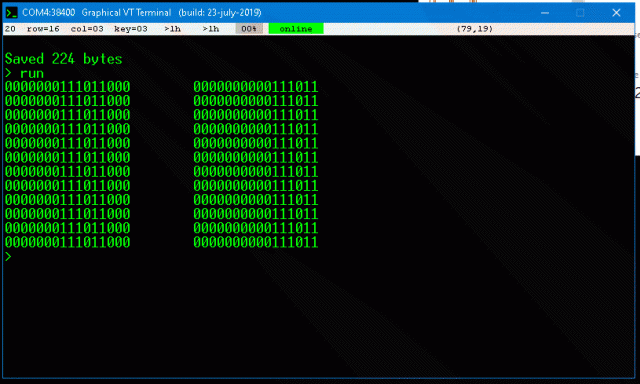 Does not matter if I touch the thermocouple or not, result is always the same. This is the result of disco4now/Geoff's code: 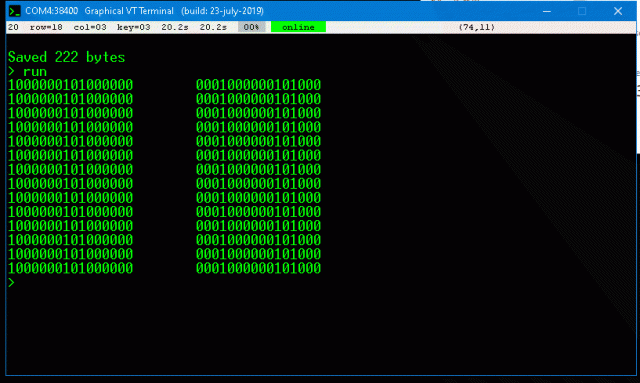 I tried slowing down to 10kHz SPI speed, and the data is ALWAYS still the same, no matter what. I will hunt out another thermocouple and try again. EDIT: Removed thermocouple unit completely, and still get the same results. Something not right here. Either the thermocouple is crook, or the chip is or something. EDIT: Put a brand new(different) thermocouple on it, still exactly the same output. I wonder if the module is a fake. I think I will order a few genuine chips in my next element14 order, and swap one of the chips. SOIC8, so easy enough to remove. I can already hear WhiteWizzard scolding me for this.....  Edited 2021-07-25 14:55 by Grogster Smoke makes things work. When the smoke gets out, it stops! |
||||
TassyJim Guru Joined: 07/08/2011 Location: AustraliaPosts: 6455 |
The results form Phil's code looks like 14.75 degrees. Could that be your current ambient? If so, it might indicate that you have t+ and t- shorted. Try that code again with the thermocouple removed but t- still connected to ground. That should light up bit D2 Jim Just saw your edit - you must be a mind reader. Look for a short between the two input pins. Edited 2021-07-25 14:51 by TassyJim VK7JH MMedit |
||||
Grogster Admin Group Joined: 31/12/2012 Location: New ZealandPosts: 9877 |
Hi Jim.  No, ambient is 22'C or so. Result of disconnecting T+, but leaving T- connected: (T- is grounded) 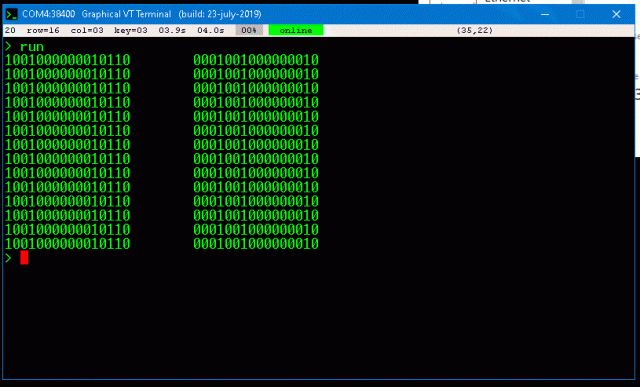 Edited 2021-07-25 15:05 by Grogster Smoke makes things work. When the smoke gets out, it stops! |
||||
TassyJim Guru Joined: 07/08/2011 Location: AustraliaPosts: 6455 |
OK, Bit 2 has correctly gone high to indicate open circuit thermocouple. Next try shorting T+ and T- VK7JH MMedit |
||||
Grogster Admin Group Joined: 31/12/2012 Location: New ZealandPosts: 9877 |
FOUND THE PROBLEM!!!! I was NOT releasing the CS pin at the end of each reading, so I guess the chip was doing ONE sample, and then cos I never released the CS pin, it just kept sending the same data each time through the loop.  Results I am getting now: (third column is degrees C) 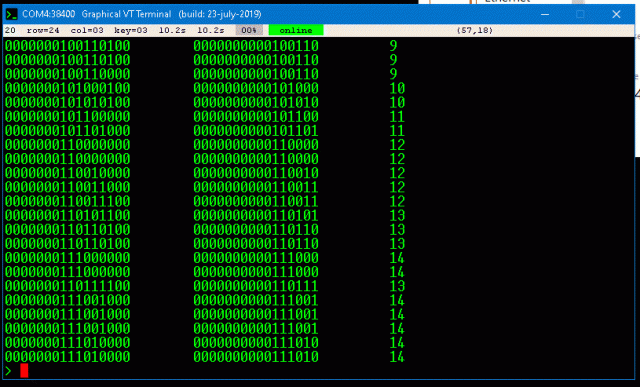 ...and the code I am now using: 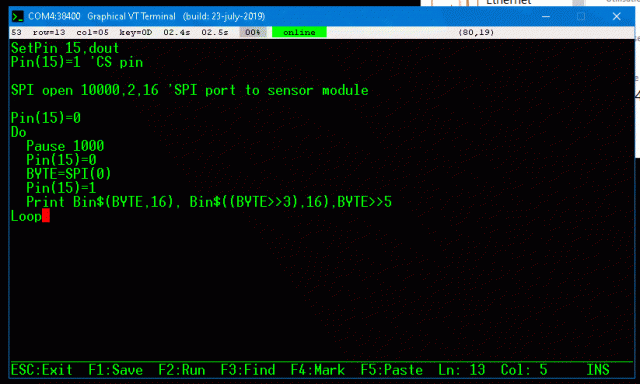 Now that I have it working, I can now experiment some more. Results are coming in now for both the original thermo, and the new one I tried. Smoke makes things work. When the smoke gets out, it stops! |
||||
TassyJim Guru Joined: 07/08/2011 Location: AustraliaPosts: 6455 |
That's good news. Something to store in the memory bank for later use... Jim I went looking through the data sheet again: Edited 2021-07-25 15:29 by TassyJim VK7JH MMedit |
||||
| Page 1 of 2 |
|||||
| The Back Shed's forum code is written, and hosted, in Australia. | © JAQ Software 2026 |